 | ÐлекÑÑоннÑй компоненÑ: IRG4BC30K | СкаÑаÑÑ:  PDF PDF  ZIP ZIP |
Äîêóìåíòàöèÿ è îïèñàíèÿ www.docs.chipfind.ru
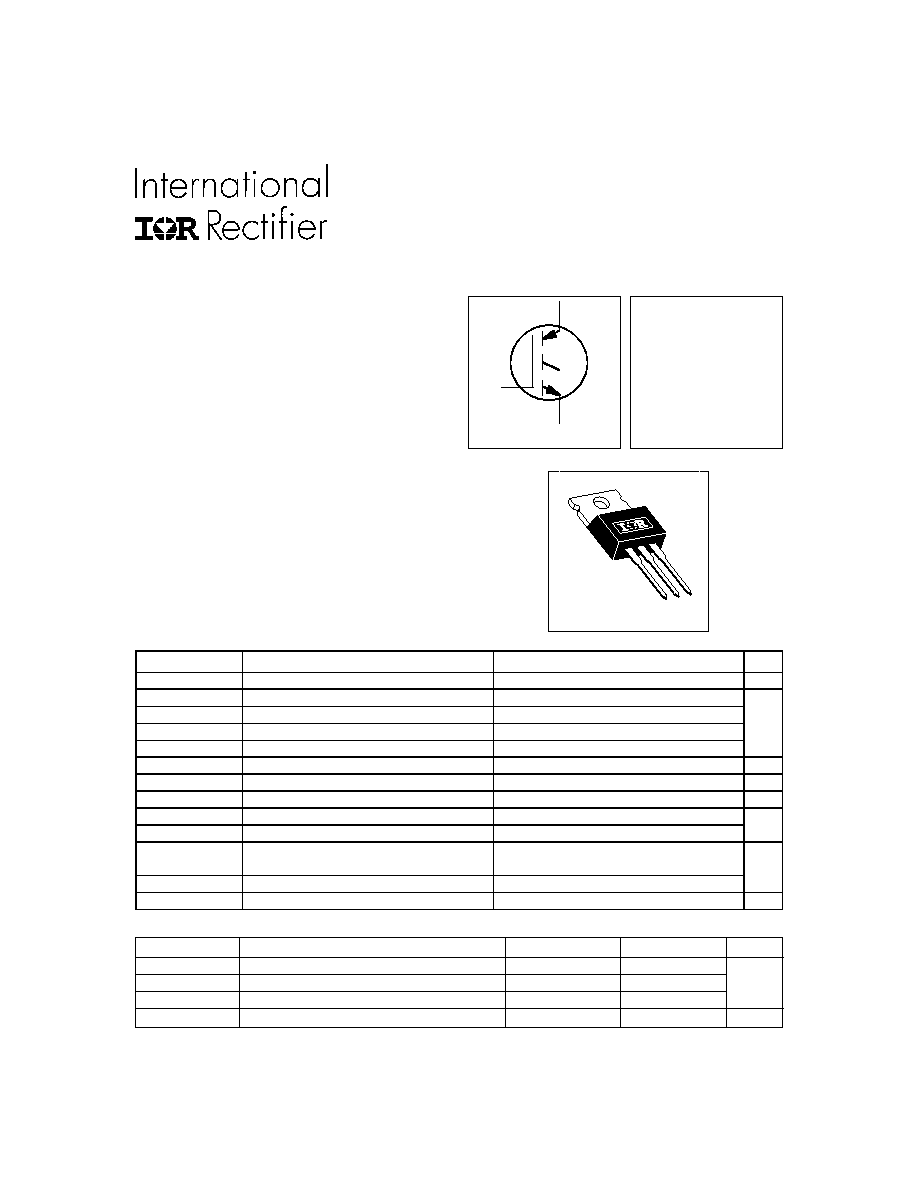
4/24/2000
V
CES
= 600V
V
CE(on) typ.
=
2.21V
@V
GE
= 15V, I
C
= 16A
Absolute Maximum Ratings
Parameter
Max.
Units
V
CES
Collector-to-Emitter Voltage
600
V
I
C
@ T
C
= 25°C
Continuous Collector Current
28
I
C
@ T
C
= 100°C
Continuous Collector Current
16
A
I
CM
Pulsed Collector Current
Q
58
I
LM
Clamped Inductive Load Current
R
58
t
sc
Short Circuit Withstand Time
10
µs
V
GE
Gate-to-Emitter Voltage
±20
V
E
ARV
Reverse Voltage Avalanche Energy
S
260
mJ
P
D
@ T
C
= 25°C
Maximum Power Dissipation
100
W
P
D
@ T
C
= 100°C
Maximum Power Dissipation
42
T
J
Operating Junction and
-55 to +150
T
STG
Storage Temperature Range
°C
Soldering Temperature, for 10 sec.
300 (0.063 in. (1.6mm) from case)
Mounting torque, 6-32 or M3 screw.
10 lbf·in (1.1N·m)
IRG4BC30K
Short Circuit Rated
UltraFast IGBT
INSULATED GATE BIPOLAR TRANSISTOR
PD - 91596A
Parameter
Typ.
Max.
Units
R
JC
Junction-to-Case
1.2
R
CS
Case-to-Sink, Flat, Greased Surface
0.5
°C/W
R
JA
Junction-to-Ambient, typical socket mount
80
Wt
Weight
1.44
g
Thermal Resistance
E
C
G
n-channel
TO-220AB
Features
Features
Features
Features
Features
· High short circuit rating optimized for motor control,
t
sc
=10µs, @360V V
CE
(start), T
J
= 125°C,
V
GE
= 15V
· Combines low conduction losses with high
switching speed
· Latest generation design provides tighter parameter
distribution and higher efficiency than previous
generations
· As a Freewheeling Diode we recommend our
HEXFRED
TM
ultrafast, ultrasoft recovery diodes for
minimum EMI / Noise and switching losses in the
Diode and IGBT
· Latest generation 4 IGBTs offer highest power
density motor controls possible
· This part replaces the IRGBC30K and IRGBC30M
devices
Benefits
www.irf.com
1
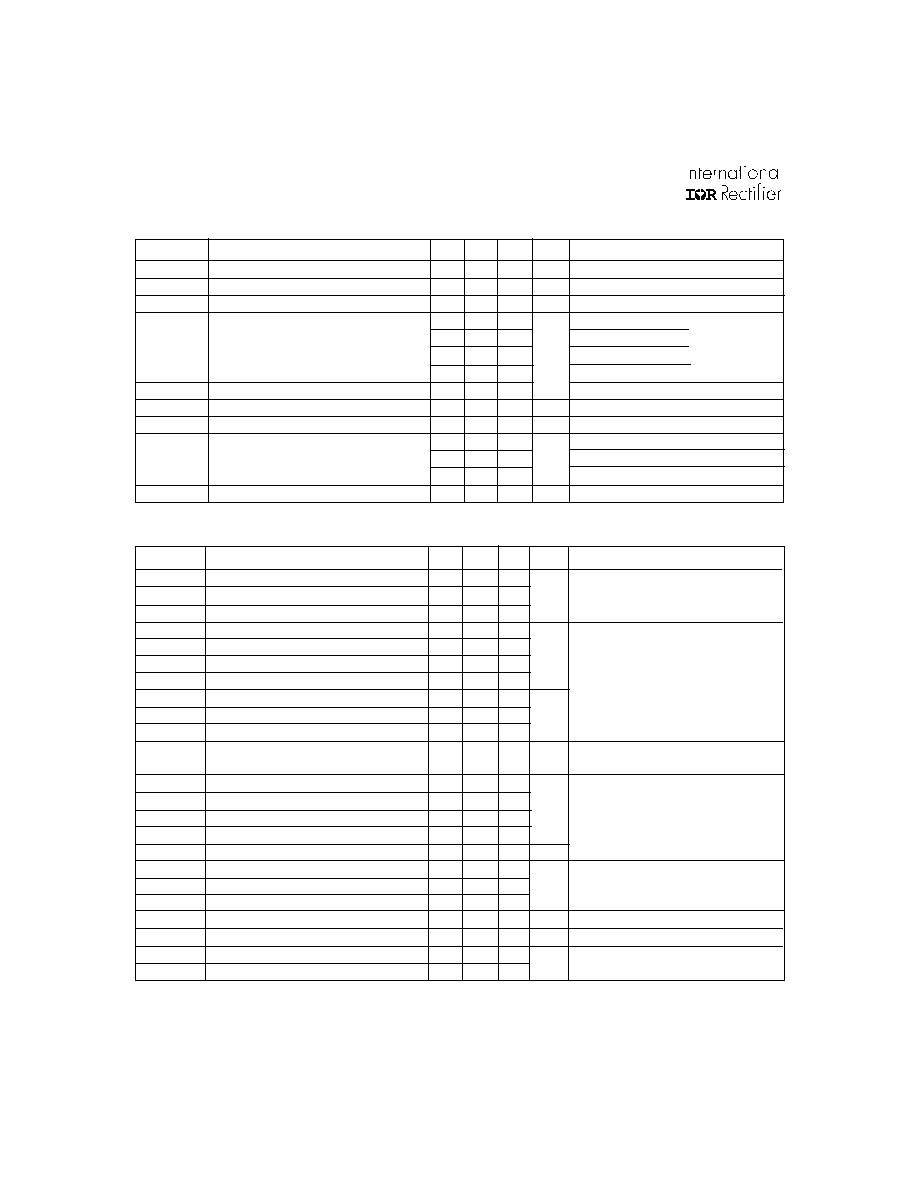
IRG4BC30K
2
www.irf.com
Parameter
Min. Typ. Max. Units
Conditions
V
(BR)CES
Collector-to-Emitter Breakdown Voltage
600
--
--
V
V
GE
= 0V, I
C
= 250µA
V
(BR)ECS
Emitter-to-Collector Breakdown Voltage
T
18
--
--
V
V
GE
= 0V, I
C
= 1.0A
V
(BR)CES
/
T
J
Temperature Coeff. of Breakdown Voltage
--
0.54
--
V/°C
V
GE
= 0V, I
C
= 1.0mA
--
2.21
--
I
C
= 14A
--
2.21
2.7
I
C
= 16A V
GE
= 15V
--
2.88
--
I
C
= 28A
See Fig.2, 5
--
2.36
--
I
C
= 16A , T
J
= 150°C
V
GE(th)
Gate Threshold Voltage
3.0
--
6.0
V
CE
= V
GE
, I
C
= 250µA
V
GE(th)
/
T
J
Temperature Coeff. of Threshold Voltage
--
-12
--
mV/°C V
CE
= V
GE
, I
C
= 250µA
g
fe
Forward Transconductance
U
5.4
8.1
--
S
V
CE
=
100V, I
C
= 16A
--
--
250
V
GE
= 0V, V
CE
= 600V
I
CES
Zero Gate Voltage Collector Current
--
--
2.0
µ A
V
GE
= 0V, V
CE
= 10V, T
J
= 25°C
--
--
1100
V
GE
= 0V, V
CE
= 600V, T
J
= 150°C
I
GES
Gate-to-Emitter Leakage Current
--
--
±100
n A
V
GE
= ±20V
Electrical Characteristics @ T
J
= 25°C (unless otherwise specified)
V
V
CE(ON)
Collector-to-Emitter Saturation Voltage
Details of note
Q
through
U
are on the last page
Parameter
Min. Typ. Max. Units
Conditions
Q
g
Total Gate Charge (turn-on)
--
67
100
I
C
= 16A
Q
ge
Gate - Emitter Charge (turn-on)
--
11
16
nC
V
CC
= 400V
See Fig.8
Q
gc
Gate - Collector Charge (turn-on)
--
25
37
V
GE
= 15V
t
d(on)
Turn-On Delay Time
--
26
--
t
r
Rise Time
--
28
--
T
J
= 25°C
t
d(off)
Turn-Off Delay Time
--
130
200
I
C
= 16A, V
CC
= 480V
t
f
Fall Time
--
120
170
V
GE
= 15V, R
G
= 23
E
on
Turn-On Switching Loss
--
0.36
--
Energy losses include "tail"
E
off
Turn-Off Switching Loss
--
0.51
--
mJ
See Fig. 9,10,14
E
ts
Total Switching Loss
--
0.87
1.3
t
sc
Short Circuit Withstand Time
10
--
--
µs
V
CC
= 400V, T
J
= 125°C
V
GE
= 15V, R
G
= 23
, V
CPK
< 500V
t
d(on)
Turn-On Delay Time
--
25
--
T
J
= 150°C,
t
r
Rise Time
--
29
--
I
C
= 16A, V
CC
= 480V
t
d(off)
Turn-Off Delay Time
--
190
--
V
GE
= 15V, R
G
= 23
t
f
Fall Time
--
190
--
Energy losses include "tail"
E
ts
Total Switching Loss
--
1.2
--
mJ
See Fig. 11,14
E
on
Turn-On Switching Loss
--
0.26
--
T
J
= 25°C
,
V
GE
= 15V, R
G
= 23
E
off
Turn-Off Switching Loss
--
0.36
--
I
C
= 14A, V
CC
= 480V
E
ts
Total Switching Loss
--
0.62
--
Energy losses include "tail"
L
E
Internal Emitter Inductance
--
7.5
--
nH
Measured 5mm from package
C
ies
Input Capacitance
--
920
--
V
GE
= 0V
C
oes
Output Capacitance
--
110
--
pF
V
CC
= 30V
See Fig. 7
C
res
Reverse Transfer Capacitance
--
27
--
= 1.0MHz
Switching Characteristics @ T
J
= 25°C (unless otherwise specified)
ns
ns
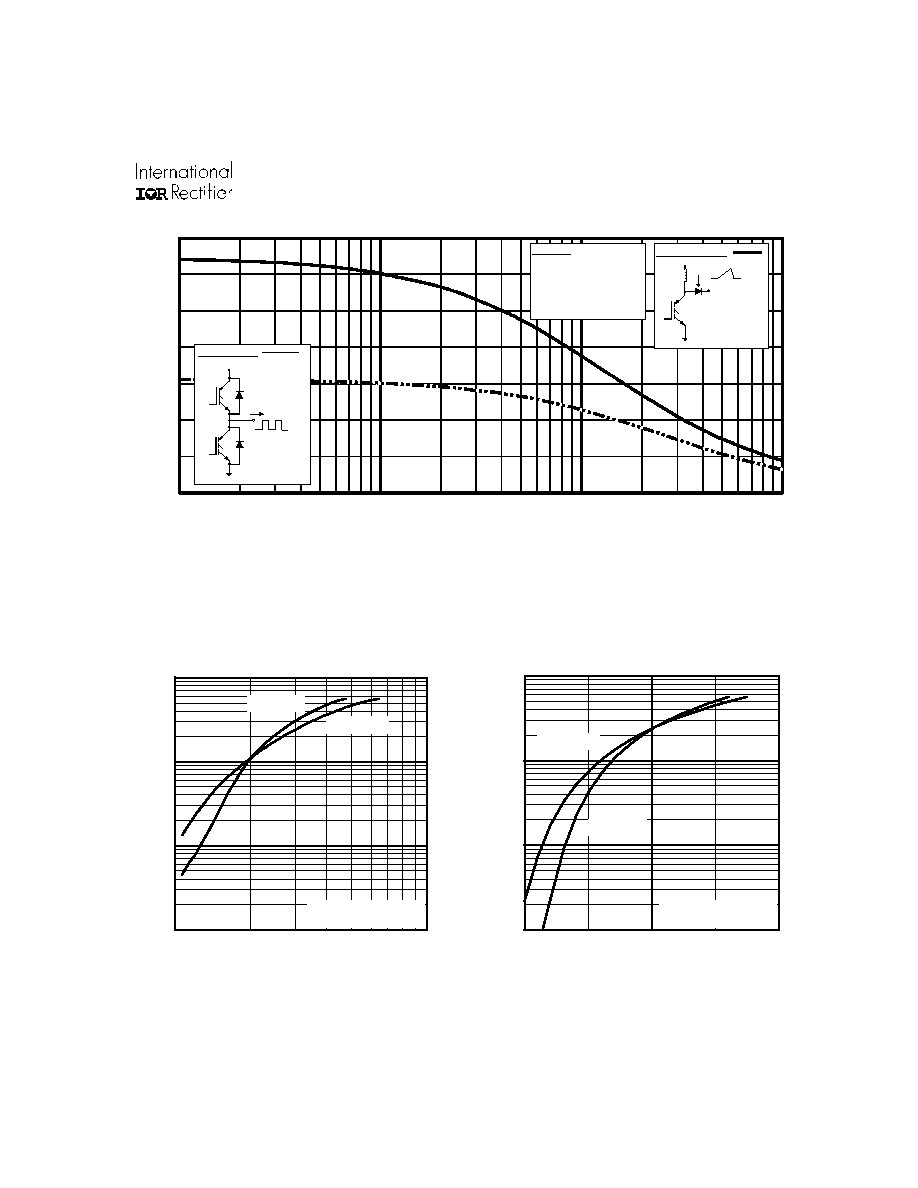
IRG4BC30K
www.irf.com
3
Fig. 1 - Typical Load Current vs. Frequency
(Load Current = I
RMS
of fundamental)
Fig. 2 - Typical Output Characteristics
Fig. 3 - Typical Transfer Characteristics
0.1
1
10
100
1
10
V , Collector-to-Emitter Voltage (V)
I , Collector-to-Emitter Current (A)
CE
C
V = 15V
20µs PULSE WIDTH
GE
T = 25 C
J
o
T = 150 C
J
o
0.1
1
10
100
5
10
15
V , Gate-to-Emitter Voltage (V)
I , Collector-to-Emitter Current (A)
GE
C
V = 50V
5µs PULSE WIDTH
CC
T = 25 C
J
o
T = 150 C
J
o
Load Current ( A )
0
5
1 0
1 5
2 0
2 5
3 0
3 5
0 . 1
1
1 0
1 0 0
f, Frequency (kHz)
A
6 0 % o f ra t e d
v o lt a g e
I
Id e al d io de s
S q u a re wave :
F o r b o t h :
D uty c y c le : 5 0%
T = 1 2 5° C
T = 90 °C
G a te d rive a s s pe c ified
s in k
J
T ria n g u la r w a ve :
I
C la m p vo l ta g e :
8 0 % o f r a te d
P o w e r D is si p a tio n = 2 1 W
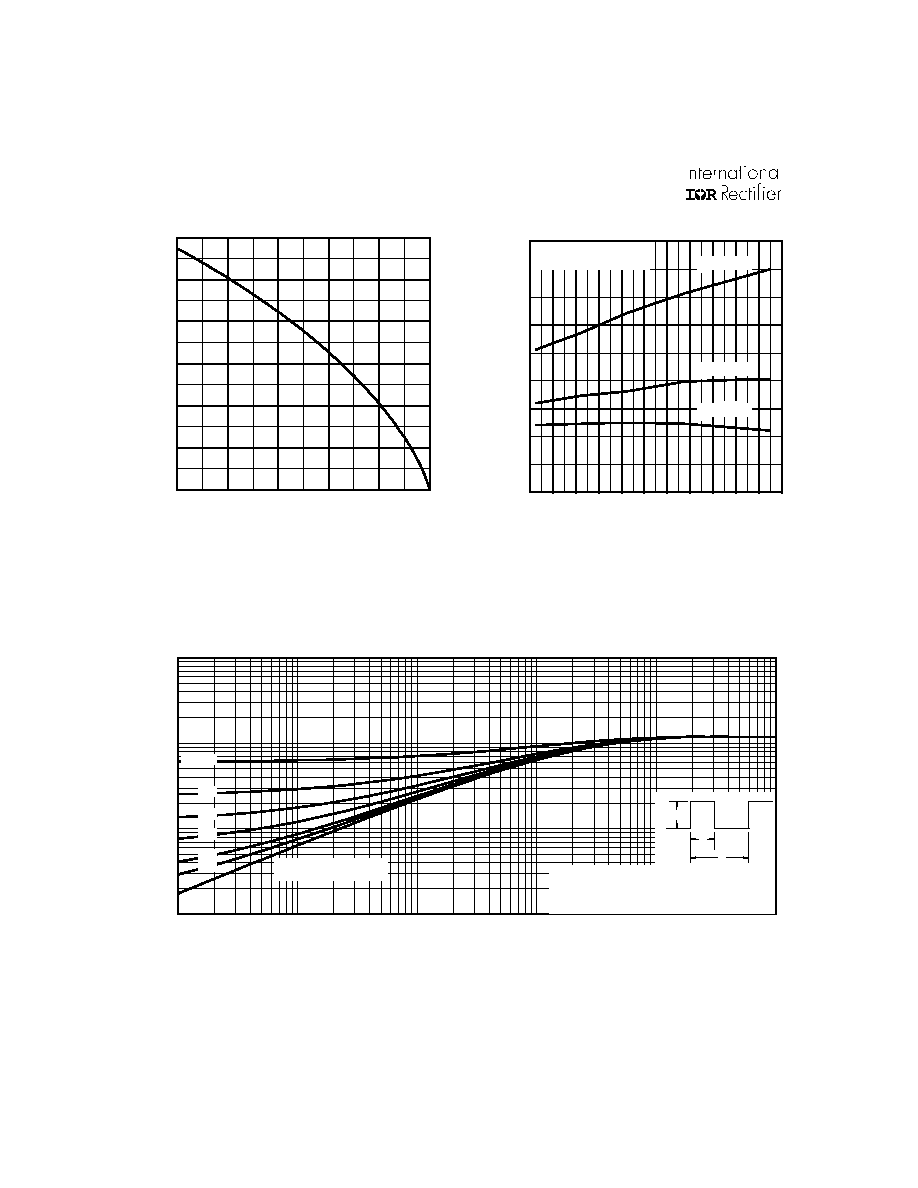
IRG4BC30K
4
www.irf.com
-60 -40 -20
0
20
40
60
80 100 120 140 160
1.0
2.0
3.0
4.0
T , Junction Temperature ( C)
V , Collector-to-Emitter Voltage(V)
J
°
CE
V = 15V
80 us PULSE WIDTH
GE
I = A
8
C
I = A
16
C
I = A
32
C
Fig. 6 - Maximum Effective Transient Thermal Impedance, Junction-to-Case
Fig. 5 - Typical Collector-to-Emitter Voltage
vs. Junction Temperature
Fig. 4 - Maximum Collector Current vs. Case
Temperature
25
50
75
100
125
150
0
5
10
15
20
25
30
T , Case Temperature ( C)
Maximum DC Collector Current(A)
C
°
0.01
0.1
1
10
0.00001
0.0001
0.001
0.01
0.1
1
Notes:
1. Duty factor D = t / t
2. Peak T = P
x Z
+ T
1
2
J
DM
thJC
C
P
t
t
DM
1
2
t , Rectangular Pulse Duration (sec)
Thermal Response (Z )
1
thJC
0.01
0.02
0.05
0.10
0.20
D = 0.50
SINGLE PULSE
(THERMAL RESPONSE)
8.0A
T
J
, Junction Temperature ( °C )
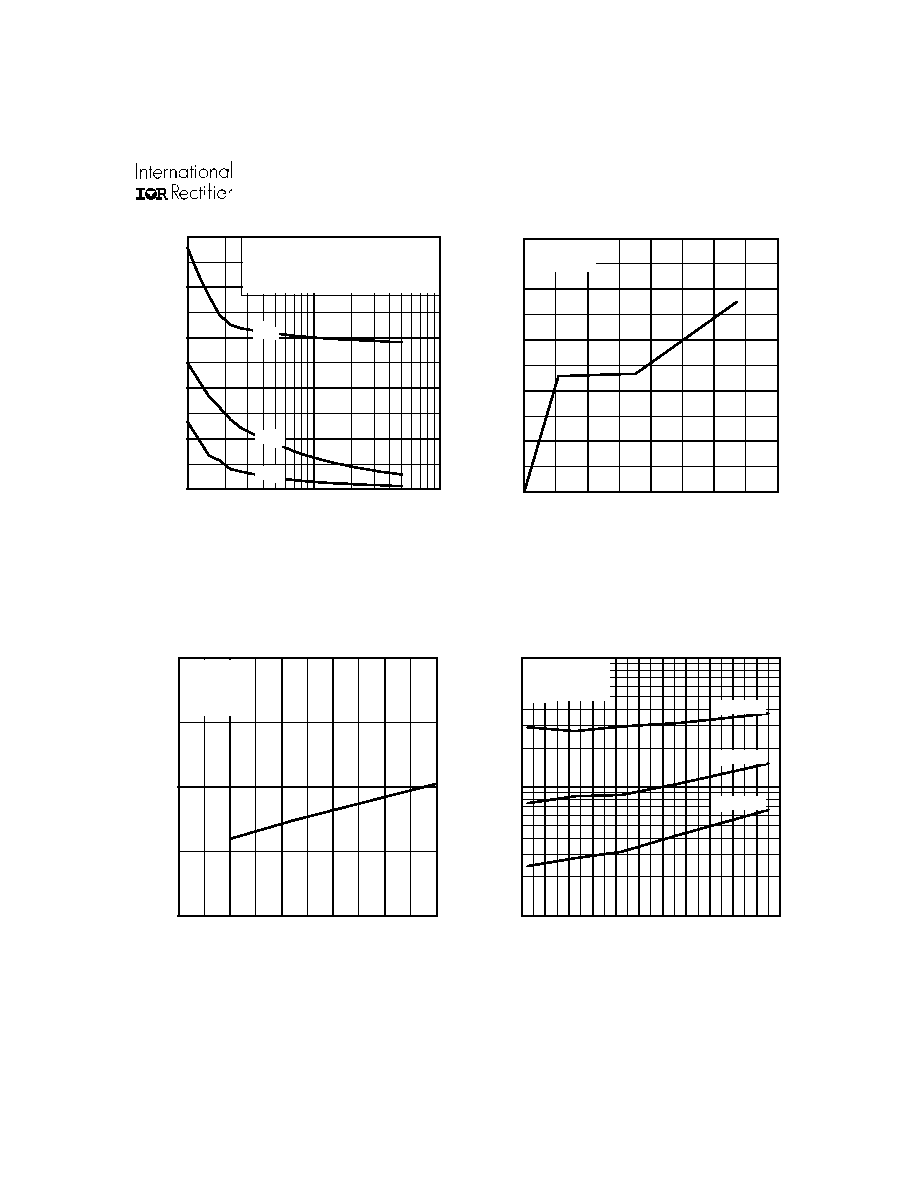
IRG4BC30K
www.irf.com
5
Fig. 7 - Typical Capacitance vs.
Collector-to-Emitter Voltage
Fig. 8 - Typical Gate Charge vs.
Gate-to-Emitter Voltage
Fig. 9 - Typical Switching Losses vs. Gate
Resistance
Fig. 10 - Typical Switching Losses vs.
Junction Temperature
0
20
40
60
80
0
4
8
12
16
20
Q , Total Gate Charge (nC)
V , Gate-to-Emitter Voltage (V)
G
GE
V
= 400V
I
= 16A
CC
C
0
10
20
30
40
50
0.5
1.0
1.5
R , Gate Resistance (Ohm)
Total Switching Losses (mJ)
G
V = 480V
V = 15V
T = 25 C
I = 16A
CC
GE
J
C
°
-60 -40 -20
0
20
40
60
80 100 120 140 160
0.1
1
10
T , Junction Temperature ( C )
Total Switching Losses (mJ)
J
°
R = Ohm
V = 15V
V = 480V
G
GE
CC
I = A
32
C
I = A
16
C
I = A
8
C
23
1
10
100
0
300
600
900
1200
1500
V , Collector-to-Emitter Voltage (V)
C, Capacitance (pF)
CE
V
C
C
C
=
=
=
=
0V,
C
C
C
f = 1MHz
+ C
+ C
C SHORTED
GE
ies
ge
gc ,
ce
res
gc
oes
ce
gc
Cies
Coes
Cres
8.0A




